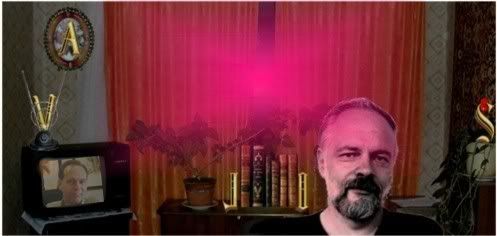Monday, 7 January 2013
Philip K. Dick - VALIS
Ben Robinson - Object in Blacklight Poster Graphics III , 2005
Philip Kindred Dick (December 16, 1928 – March 2, 1982) was an American novelist, short story writer and essayist whose published work is almost entirely in the science fiction genre. Dick explored sociological, political and metaphysical themes in novels dominated by monopolistic corporations, authoritarian governments, and altered states. In his later works Dick's thematic focus strongly reflected his personal interest in metaphysics and theology. He often drew upon his own life experiences in addressing the nature of drug abuse, paranoia, schizophrenia, and transcendental experiences in novels such as A Scanner Darkly and VALIS.
http://en.wikipedia.org/wiki/Philip_K._Dick
Ben Robinson - Valis Exegesis (On Behalf of Philip K Dick), 2003
VALIS is a 1981 science fiction novel by Philip K. Dick. The title is an acronym for Vast Active Living Intelligence System, Dick's gnostic vision of one aspect of God.
VALIS has been described as one node of an artificial satellite network originating from the star Sirius in the Canis Major constellation. According to Dick, the Earth satellite used "pink laser beams" to transfer information and project holograms on Earth and to facilitate communication between an extraterrestrial species and humanity. Dick claimed that VALIS used "disinhibiting stimuli" to communicate, using symbols to trigger recollection of intrinsic knowledge through the loss of amnesia, achieving gnosis. Drawing directly from Platonism and Gnosticism, Dick wrote in his Exegesis: "We appear to be memory coils (DNA carriers capable of experience) in a computer-like thinking system which, although we have correctly recorded and stored thousands of years of experiential information, and each of us possesses somewhat different deposits from all the other life forms, there is a malfunction - a failure - of memory retrieval."
http://en.wikipedia.org/wiki/VALIS
There is an idea that wants to be born, it has wanted to be born for a very long time. And sometimes that longing to be born settles on a person. For no damn good reason. Then you’re "it," you become the cheese, and the cheese stands alone. You are illuminated and maddened and lifted up by something great beyond all telling. It wants to be told. It’s just that this idea is so damn big that it can’t be told, or rather the whole of history is the telling of this idea, the stuttering rambling effort of the sons and daughters of poor old Noah to tell this blinding, reality-shattering, bowel-loosening truth. And Phil had a piece of the action, a major piece of the action.
The experience is private, personal, the best part, and ultimately unspeakable. The more you know the quieter you get. The explanation is another matter and can be attempted. In fact it must be told, for the Logos speaks and we are its tools and its voice. Phil says a lot of things in the Exegesis, he is aware that he says too much, so he keeps trying to boil it down to ten points or twelve parts or whatever. I have my own experience, equally unspeakable, and my explanation, equally prolix. Phil (sometimes) thought he was Christ, I (sometimes) thought I was an extraterrestrial invader disguised as a meadow mushroom. What matters is the system that eventually emerges, not the fantasies concerning the source of the system. When I compare Phil’s system to mine, my hair stands on end. We were both contacted by the same unspeakable something. Two madmen dancing, not together, but the same dance anyhow.
Truth or madness, you be the judge. What is trying to be expressed is this: The world is not real. Reality is not stranger than you suppose, it is stranger than you can suppose. Time is not what you think it is. Reality is a hologram. Being is a solid state matrix and psychosis is the redemptive process ne plus ultra. The real truth is splintered and spread throughout time.
Terence Mckenna
http://www.sirbacon.org/dick.htm
Unlike most religious seers, Dick did not approach his visions with anything like certitude. Dick distrusted reification of any sort (his novels constantly wage war against the process that turns people and ideas into things), and so he refused to solidify his experiences into a belief system. Like William Blake, another impoverished autodidact whose bubbling imagination was steeped in the Western visionary tradition, Dick approached his theophany (or "in-breaking of God") as artistic material, reworking it in his writings with an artist's commitment to irony, craft, and a political bite. Even in his private journals, he constantly liquefies his revelations, writing with a modern thinker's sense of the tentativeness of speculative thought. "Indeterminacy is the central characteristic of 2-3-74," writes Sutin in his Dick biography Divine Invasions. Sutin points out that mystics traditionally interpret their experiences within the faiths they are raised in. "Phil adhered to no single faith. The one tradition indubitably his was SF—which exalts 'What IF?' above all. In 2-3-74, all the 'What IFs?' were rolled up into one."
Erik Davies
http://www.techgnosis.com/pkdnet.html
Subscribe to:
Post Comments (Atom)





No comments:
Post a Comment